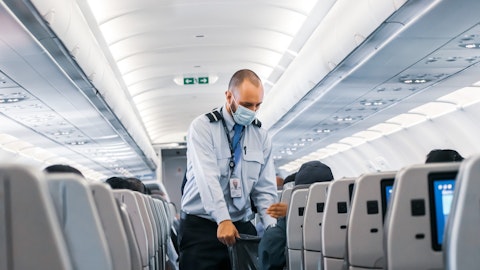So it’s nervous because of the cash burn or the cash gap that we had in 2023 that we had projected for 2023 and not because of the debt, not because of the leverage. Having said that, you should see a small reduction in net debt, if you’re using IFRS 16 and you should — a lot of that depends on where our incremental cost of borrow will be by the time we finalize all this, because for those of you that maybe are not too familiar with IFRS 16, I have to use my incremental cost of borrow to calculate the present value of the leases. I don’t have an option, right. And so whatever that cost of borrowing is at the time when we renegotiated our leases originally during the beginning of the pandemic, it was in a 20%, right. And we’ll see where it is once we are done here and that will determine a lot of what the present value on our balance sheet will be depending on what that number is.
But we believe with our estimates on what makes sense, you should see a small reduction in net debt, if you’re using our app IFRS 16. Now if you’re using 7 times rent, you should see a significant reduction in leverage, right, because even if you were doing it right and you were not including the deferrals in your calculation, right, if you were taking the recurrent rent, you’re taking sort of the total rent payments subtracting what was deferral related and leaving only the current rent and multiplying that by 7 times because the rents are going to be reset to market values, you should see a significant reduction in the lease liability, it’s going to be 40% offset by 2030 note, but the net result should be a reduction in net debt.
Abhi Shah: Yeah. And regarding the fuel tax discussion, we’ve already assumed any potential changes in our EBITDA number for this year. So it’s already in our model and we’re already planning for potential changes. So it does not impact the BRL5 billion plus EBITDA guidance that we’re giving today.
Alex Malfitani: But that’s with what we know so far, right. The way we always talk about sort of government help, there’s always a lot of talk, I think it makes sense for the government to stimulate travel in Brazil, this is a continental sized country where aviation can provide a lot of social benefits, can generate economic growth that can create jobs and potentially there is something that’s coming, but we never include that potential upside in any of our guidance, in any of our planning, right, if it comes it will be additional upside. We’re only including what is known and that we can count on in our guidance.
Rogerio Araujo: Fair enough. Very clear. Thanks very much.
John Rodgerson: Thank you, Rogerio.
Operator: Okay. That brings our Q&A session to a close. I would like now invite John Rodgerson for closing remarks. Please, John.
John Rodgerson: I’d like to thank everybody for joining the call today, and feel free to reach out to us, if you have any questions. We’re really excited about what we were able to accomplish in such a short amount of time and there’s a lot more work to be done. And so we look forward to updating you in the market over the course of the next few months. Thanks everybody for joining us.
Operator: Okay. Thank you. This concludes the Azul’s audio conference call for today. Thank you very much for your participation, and have a good day.
Follow Azul Sa (NYSE:AZUL)
Follow Azul Sa (NYSE:AZUL)
Receive real-time insider trading and news alerts





